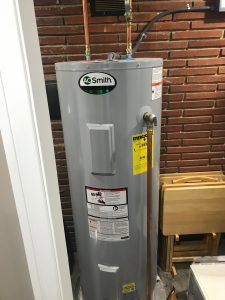What're your ideas about Water Heater Repair and Troubleshooting?

Picture beginning your day without your routine warm shower. That already sets an inadequate tone for the rest of your day.
Every residence needs a reputable water heater, however just a few recognize how to handle one. One very easy way to keep your hot water heater in leading form is to check for faults on a regular basis and fix them as quickly as they show up.
Bear in mind to turn off your water heater before sniffing around for faults. These are the water heater faults you are most likely to experience.
Water too hot or too cold
Every water heater has a thermostat that identifies how warm the water obtains. If the water entering your house is also hot regardless of establishing a practical maximum temperature level, your thermostat may be faulty.
On the other hand, also cold water may result from a stopped working thermostat, a broken circuit, or inappropriate gas flow. For instance, if you make use of a gas water heater with a busted pilot light, you would certainly get cold water, even if the thermostat remains in perfect condition. For electrical heaters, a blown fuse might be the perpetrator.
Insufficient warm water
Hot water heater can be found in many dimensions, depending upon your warm water needs. If you lack warm water before everybody has actually had a bathroom, your water heater is too tiny for your family size. You need to consider setting up a bigger hot water heater container or going with a tankless water heater, which takes up less space and is much more resilient.
Weird sounds
There go to the very least five type of noises you can hear from a water heater, but one of the most usual analysis is that it's time for the hot water heater to retire.
First off, you must recognize with the typical sounds a hot water heater makes. An electrical heating unit may appear different from a gas-powered one.
Popping or banging audios normally indicate there is a slab of debris in your storage tanks, and it's time to cleanse it out. On the other hand, whistling or hissing sounds might simply be your shutoffs letting some stress off.
Water leaks
Leakages could originate from pipes, water links, valves, or in the worst-case circumstance, the tank itself. With time, water will rust the container, as well as locate its way out. If this occurs, you need to replace your hot water heater as soon as possible.
Nevertheless, prior to your adjustment your entire tank, make sure that all pipelines remain in area and that each valve works completely. If you still require assistance recognizing a leakage, call your plumber.
Rust-colored water
Rust-colored water means one of your water heater components is rusted. It could be the anode rod, or the storage tank itself. Your plumber will certainly have the ability to identify which it is.
Warm water
No matter just how high you established the thermostat, you won't get any type of hot water out of a heater well past its prime. A water heater's efficiency might reduce with time.
You will certainly also obtain warm water if your pipes have a cross connection. This suggests that when you activate a tap, hot water from the heating system streams in alongside normal, cold water. A cross link is easy to spot. If your warm water faucets still pursue shutting the water heater shutoffs, you have a cross connection.
Discoloured Water
Corrosion is a major root cause of dirty or discoloured water. Deterioration within the water tank or a failing anode pole could trigger this discolouration. The anode pole safeguards the container from rusting on the inside as well as need to be checked annual. Without a pole or a correctly operating anode rod, the warm water promptly corrodes inside the storage tank. Call a specialist water heater service technician to establish if changing the anode rod will repair the trouble; otherwise, change your hot water heater.
Conclusion
Ideally, your water heater can last 10 years before you need a change. However, after the 10-year mark, you might experience any one of these mistakes extra frequently. At this moment, you ought to add a brand-new hot water heater to your budget plan.
How To Troubleshoot 3 Common Water Heater Problems in Twin Cities
The Water Heater Is Leaking
A leaky cold water inlet valve A loose pipe fitting A leaky temperature and pressure relief valve A corroded anode rod A cracked tank Turn Off Your Water Heater:
Shut off your gas water heater by turning the gas valve on the unit to the “OFF” position. Shut off your electric water by switching its power off at your electrical panel. Look for a two-pole breaker labeled “water heater” and turn it to the “OFF” position. Move the ball valve connected to the water heater to be perpendicular to the piping at a 90° angle. Look for the Leak:
Depending on whether the water is coming from the tank's top or bottom, you’ll want to look for the leak in different locations.
If the leak comes from the top of the tank, carefully look for water escaping from the cold water inlet valve or loose pipe fittings. Rusted hot and cold water valves can have loose connections with the tank, with water leaking out of them.
https://mspplumbingheatingair.com/blog/how-to-troubleshoot-3-common-water-heater-problems
I'm just very eager about Common Problems with Tank Water Heaters and I'm hoping you liked our post. Enjoyed our piece? Please share it. Help other people find it. I praise you for your time. Kindly pay a visit to our site back soon.
Ready to assist!